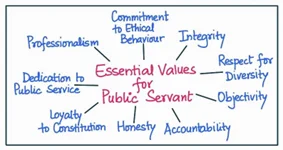Answer:
| Approach:
Introduction
- Write about the civil service and importance of values.
Body
- Mention the Ten essential values that are needed to be an effective public servant.
- Add examples to substantiate your points.
Conclusion:
- Conclude with the way forward.
|
Introduction:
Public servants hold a critical role in serving the interests of the public, promoting the common good, and upholding the principles of good governance. To be effective in their roles, public servants must possess a set of essential values that guide their actions and decisions.

Body:
Ten essential values that are needed to be an effective public servant are:
- Integrity: The ability to maintain ethical standards and principles.
- Example: IAS officer Ashok Khemka, who refused to bow to political pressure and transferred several times for his integrity.
- Honesty: The ability to tell the truth and be transparent in dealings.
- Example: IAS officer Tukaram Munde, known for his honesty and transparency in carrying out his duties.
- Objectivity: The ability to make decisions based on evidence and facts, rather than personal biases or interests.
- Example: Election Commission of India, which operates independently to ensure free and fair elections.
- Accountability: The ability to take responsibility for actions and decisions.
- Example: Municipal Corporation of Greater Mumbai, which has set up a mechanism for citizens to hold officials accountable for their actions.
- Transparency: The ability to provide information and be open in dealings.
- Example: Central Information Commission, which ensures transparency in government processes by providing citizens the right to access information.
- Respect for diversity: The ability to value and respect differences in culture, ethnicity, and religion.
- Example: IAS officer Rohini Sindhuri Dasari, who organized a cultural festival to promote diversity in her district.
- Professionalism: The ability to maintain high standards of conduct and behavior.
- Example: Indian Police Service officer Kiran Bedi, known for her professionalism and dedication to public service.
- Loyalty to the Constitution and the nation: The ability to prioritize national interests over personal or political interests.
- Example: Former President of India Dr. A.P.J. Abdul Kalam, who was known for his loyalty to the nation and his commitment to its progress and development.
- Dedication to public service: The ability to serve the public interest with sincerity and commitment.
- Example: IAS officer K. Vijayendra Pandian, who worked tirelessly to improve public service delivery in his district.
- Commitment to ethical behavior and principles: The ability to follow ethical principles and values in all actions and decisions.
- Example: Indian Administrative Service officer Pradeep Singh, who scored the first rank in the UPSC civil services examination in 2019 and credited his success to his commitment to ethical behavior and principles.
To prevent unethical behavior in public servants, some ways and means are:
Training and education: The Government of India has launched several training and education programs for public servants, such as the mandatory online training on ethics and integrity for all IAS officers.
- Code of conduct: The Central Civil Services (Conduct) Rules, 1964, outline the ethical behavior expected of all public servants in India.
- Monitoring and enforcement: The Central Vigilance Commission (CVC) is an independent body that monitors and enforces ethical behavior in government agencies and public servants.
- Whistle-blower protection: The Whistle-blower Protection Act, 2014, provides protection to whistle-blowers who report corruption or malpractices in government agencies.
- Transparency and accountability: The Right to Information Act, 2005, promotes transparency and accountability in government processes by allowing citizens to access government information.
Conclusion:
To prevent unethical behavior in public servants, there is a need to promote a culture of integrity, transparency, and accountability in public organizations. This can be achieved through strong leadership, robust accountability mechanisms, regular training and education, and a focus on rewarding and recognizing ethical behavior.
